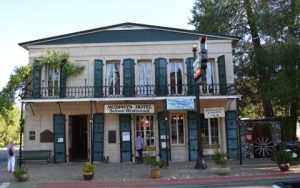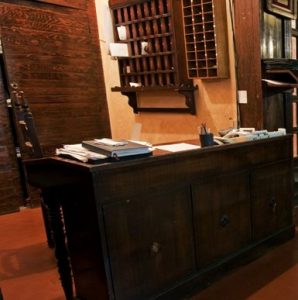The Nightingale Hotel
Vocabulary
| emerge | nightingale | drive/drove/driven |
| apron | track down | ring/rang/rung |
| reply | sign (3) | raise/rose/risen |
| fade | look for | in other words |
| intend | come by | housekeeper |
| ill | telegram | out of sight |
| oh dear | nephew | might as well |
| slightly | come out | counter (2) |
| call out | all the way | leave me alone |


The Car
A car drove up to the front of a hotel. The door opened, and a man in his 20‘s got out, and looked up at the sign above the doorway: The Nightingale Hotel.
He then went inside to the reception and rang the bell on the counter.
Nothing happened.
He rang the bell again.
The Kitchen
About 20 seconds later, a lady wearing a white apron came out from the kitchen.
The young man raised his hat. “Excuse me, madam,” he said with a smile. “I’m looking for my uncle, Mr. Yates. I believe he’s staying here.”
“He was staying here,” the lady replied. “But he has left.”
“He’s left?!? Oh dear,” said the young man as his smile faded (disappeared). “I understood that he was going to stay here for the whole month…at least, that’s what his housekeeper told me when I came by his house.”
“That’s right,” said the lady. “He had intended to stay here the whole of July, as he always does each summer.
A Phone Call
But yesterday he got a phone call. It said that one of his close friends was ill. So he immediately caught the next train back to London.”
“Oh boy,” said the young man. “This means that I’ve come all the way out here for nothing. Well, since he’s no longer here, I might as well be going.”
Drive Away
He thanked the lady and went out. The lady went to the front window and watched him drive away. When his car was completely out of sight, she called out:
“Okay, you can come out now, Mr. Yates; he’s gone.”
A man with slightly graying hair emerged from the kitchen.
Acting
“Thanks a lot, Mrs. Craven,” he said laughing. “You did that very well.”
“But Mr. Yates, don’t you want to see your nephew?” asked Mrs. Craven.
“Well the last time I met this nephew, he asked me if he could borrow seventy-five pounds. And before that, it was a hundred-and-fifty.”

Questions
Constantly. A young man came to a hotel by train. True or false?
Always. “He looked up at the sign.” Why did he look up at the sign?
Almost Always. Was there someone at the reception desk when he came in?
Normally. The young man wanted to stay in the hotel for three days. Is this right or wrong?
Usually. Did the lady told him that Mr. Yates was in Room 21? Why did he return to London? Was the young man happy? How did he feel?
Often. Mr. Yates had actually returned to London. Is this correct or incorrect?
Frequently. Why did the young man want to see Mr. Yates? Did Mr. Yates want to see him?
Sometimes. Do you think the young man is poor? Why do you think he needed money? Do you think it was an emergency? Is Mr. Yates poor, working class, middle-class, upper-middle class or rich?
Infrequently. When did this story take place?
Occasionally. I have stayed in hotels. Yes or no? What were they like?
On Occasion. Do parents and relatives always give money (or allowances) to their children, nephews or nieces?
Seldom. Should parents help their children with money, or should they be completely independent?
Rarely. Do you know of people who needed money from their parents?
Almost Never. What happens after children grow up or reach 18?
Never. The children of rich parents become rich, while children of poor and middle-class parents remain poor and middle class, respectively. What do you think?
